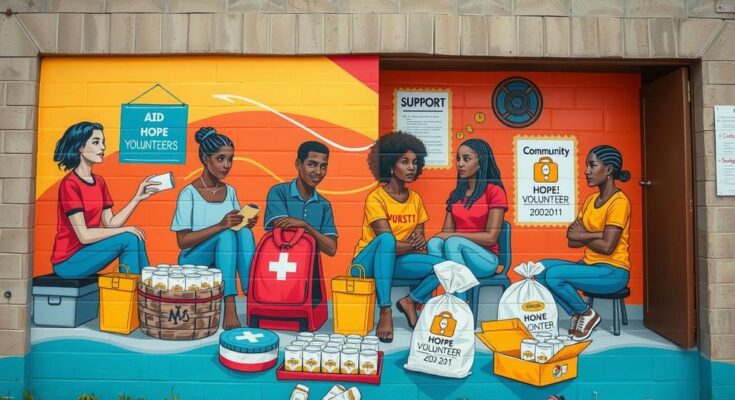Grassroots activists in Sudan are filling the void left by the collapse of state institutions amidst ongoing conflict, providing critical support services such as mental health care and family reunifications. Organizations like the Bahri Emergency Room and Safe Haven demonstrate resilience despite severe challenges, but they urgently require international assistance to sustain their efforts and address complex community needs during this humanitarian crisis.
In war-torn Sudan, abandoned by the international community, local residents have initiated grassroots efforts to address the dire humanitarian crisis resulting from the ongoing conflict between the Sudanese Armed Forces and the Rapid Support Forces. Amid sporadic aid distribution and persistent threats of violence, these volunteers have emerged as a crucial lifeline, offering mental health support, reunification services for displaced families, and essential community assistance.
Maab Labib, a mental health professional at the Bahri Emergency Room, revealed that their team, established shortly after the war began, has reached over 1,500 individuals with psychological support. Utilizing both online and in-person sessions across Khartoum and other states, their services cater to a diverse clientele, irrespective of age, gender, or nationality, including survivors of gender-based violence and soldiers.
Despite their efforts, the caregivers themselves face numerous challenges, including displacement and trauma. According to Labib, the lack of resources and persistent violence complicate the provision of support. The Bahri Emergency Room team is part of an extensive network of mutual aid initiatives that originated during Sudan’s prior revolutionary movements, establishing communal kitchens, support groups, and psychological aid training programs.
Guido Lanfranchi from the Clingendael Institute noted that these local networks represent a significant political statement about resilience during state collapse. However, these organizations have also fallen victim to attacks from both conflicting forces, reflecting the harsh realities faced by mutual aid groups in a volatile environment. Anette Hoffmann, also from Clingendael, cautioned that romanticizing these endeavors overlooks the desperate need for external resources and funding.
The United Nations reports that over 25 million Sudanese require humanitarian assistance, exacerbated by the suspension of USAID-funded programs, which has crippled the operations of many NGOs. This withdrawal has intensified the pressure on grassroots groups striving to provide essential services, leaving communities more vulnerable than ever before.
Groups like the Safe Haven Organization have adapted their services in response to the escalating crisis, managing kitchens and child-friendly spaces amidst challenging conditions. Project manager Mozamul Mohammed Ali highlighted how the organization has expanded its support to include healthcare and mental health services, as well as family reunifications, despite limited funding and resources.
Mental health issues have surged, especially among women and children, with stigma hindering access to necessary care. To address this, Safe Haven focuses on training community members in psychological first aid, equipping them with essential skills to support one another through trauma.
Grassroots leaders assert that sustained support from the international community is essential for addressing the growing complexities of needs in Sudan. Lanfranchi emphasized the critical role of grassroots activists and their efforts as forms of quiet political resistance against the backdrop of a collapsing state and absent international support. Despite the inherent risks, volunteers like Ali express a steadfast commitment to their communities, stating that they cannot stand by while their people suffer.
In conclusion, grassroots activists in Sudan are playing a pivotal role in addressing the urgent needs of war-affected communities amid a collapsing state. Their efforts reflect not only resilience but also an enduring commitment to support one another despite the myriad challenges they face. The international community must recognize and bolster these initiatives, which are vital for the survival and healing of Sudan’s population during this unprecedented crisis.
Original Source: www.arabnews.pk




